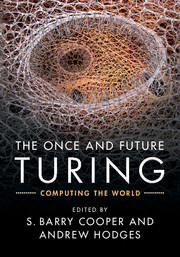Book contents
- Frontmatter
- Contents
- Contributors
- Preface
- Introduction
- Part One Inside Our Computable World, and the Mathematics of Universality
- Part Two The Computation of Processes, and Not Computing the Brain
- Part Three The Reverse Engineering Road to Computing Life
- Part Four Biology, Mind, and the Outer Reaches of Quantum Computation
- Part Five Oracles, Infinitary Computation, and the Physics of the Mind
- Afterword
Introduction
Published online by Cambridge University Press: 05 March 2016
- Frontmatter
- Contents
- Contributors
- Preface
- Introduction
- Part One Inside Our Computable World, and the Mathematics of Universality
- Part Two The Computation of Processes, and Not Computing the Brain
- Part Three The Reverse Engineering Road to Computing Life
- Part Four Biology, Mind, and the Outer Reaches of Quantum Computation
- Part Five Oracles, Infinitary Computation, and the Physics of the Mind
- Afterword
Summary
Alan Turing's short life ran from 1912 to 1954. The inspiration for this volume lay in the centenary of his birth. But Barry Cooper and I, as editors, wanted the word ‘future’ in our title, as well as a reference to the past. We chose the provocative title The Once and Future Turing, alluding to the legend of King Arthur's tomb. We invited a range of distinguished contributors to give us snapshots of scientific work which rest upon Turing's original discoveries, and share the spirit of his thought, but which also give a glimpse of something lying beyond the present. The result is a volume of 15 papers, whose authors responded to our prompting in utterly different ways.
Turing himself was not reticent about advancing visions of the future. Famously, he did so in his classic 1950 paper ‘Computing machinery and intelligence’. He was not always right. Few people would claim that his 50-year prediction for machine intelligence, cautiously phrased as it was, has been fulfilled. On the other hand, he underestimated the potential for fast, cheap, huge-scale computing. His 1948 picture of the future of computer hardware correctly identified the speed of light as the critical constraint governing computing speed. But his assumption of centimetre-scale electronic components overlooked the enormous potential for miniaturisation. Turing's foresight was more strikingly demonstrated by his 1946 observations about the power of the universal machine and the future of what would now be called the software industry; ‘every known process has got to be translated into instruction table form … ’
In 1946 he could speak with the confidence of being the mastermind of the Anglo-American crypto war – with its own legacy for the future of international relations, which, to say the least, has not yet been evaluated. In 1939 he and Gordon Welchman had pulled off the feat of persuading the British authorities to make a huge investment in the untried technology of the Turing Bombe, on the conviction, correct as it turned out, that its logical brilliance would transform British fortunes. This vision was not his alone. To beat Hitler, Bletchley Park seems to have borrowed from the future, scientifically, organisationally and socially, as if the sixties had arrived before the forties.
- Type
- Chapter
- Information
- The Once and Future TuringComputing the World, pp. xiii - xviiiPublisher: Cambridge University PressPrint publication year: 2016



